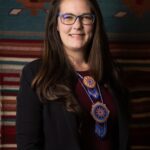Hogen Adams would like to congratulate Hogen Adams of-counsel attorney, Colette Routel, and Lac Courte Oreilles Band of Lake Superior Chippewa Indians of Wisconsin Lead Attorney, Kekek Jason Stark, for their Seventh Circuit victory in the efforts to restore night hunting rights to Wisconsin Chippewa tribes. The Plaintiff tribes are: Lac Courte Oreilles Band of Lake Superior Chippewa Indians; Lac du Flambeau Band of Lake Superior Indians; Sokaogan Chippewa Indian Community, Mole Lake Band of Wisconsin; Bad River Band of Lake Superior Chippewa Indians; St. Croix Chippewa Indians of Wisconsin; and Red Cliff Band of Lake Superior Chippewa Indians.
Under a 1991 Western District of Wisconsin judgment, the tribes were prohibited from exercising their treaty rights to off-reservation deer hunting in the ceded territory covering about the northern one-third of Wisconsin. In Lac Courte Oreilles Band of Lake Superior Chippewa Indians of Wisconsin et al. v. Wisconsin, a group of Wisconsin Chippewa tribes sought to regain the right by moving to vacate the night-hunting portion of the 1991 judgment. The Western District refused to vacate, citing a threat to public safety.
Writing for the Seventh Circuit, Judge Richard Posner found little evidence of a threat to public safety in the plans set forth by the tribes. There is “compelling reason for vacating the 1991 ruling,” Posner wrote.
The case will now return to the Western District for further evidence on whether the court should vacate the night hunting prohibition in its 1991 decision.
Routel is a professor at the William Mitchell College of Law, where she and the law students in her Indian law clinic undertake a variety pro-tribal projects. Stark is the Lead Attorney for the Lac Courte Oreilles Tribe, and he was formerly an attorney and policy analyst for the Great Lakes Indian
Fish and Wildlife Commission (GLIFWC). GLIFWIC, the driving force behind the efforts to restore the tribes’ night hunting rights, represents eleven Ojibwe tribes in Minnesota, Wisconsin, and Michigan who reserved hunting, fishing and gathering rights in the 1837, 1842, and 1854 Treaties with the United States government.
The decision is available here.
 hogenadams-admin
hogenadams-admin October 13, 2014
October 13, 2014
